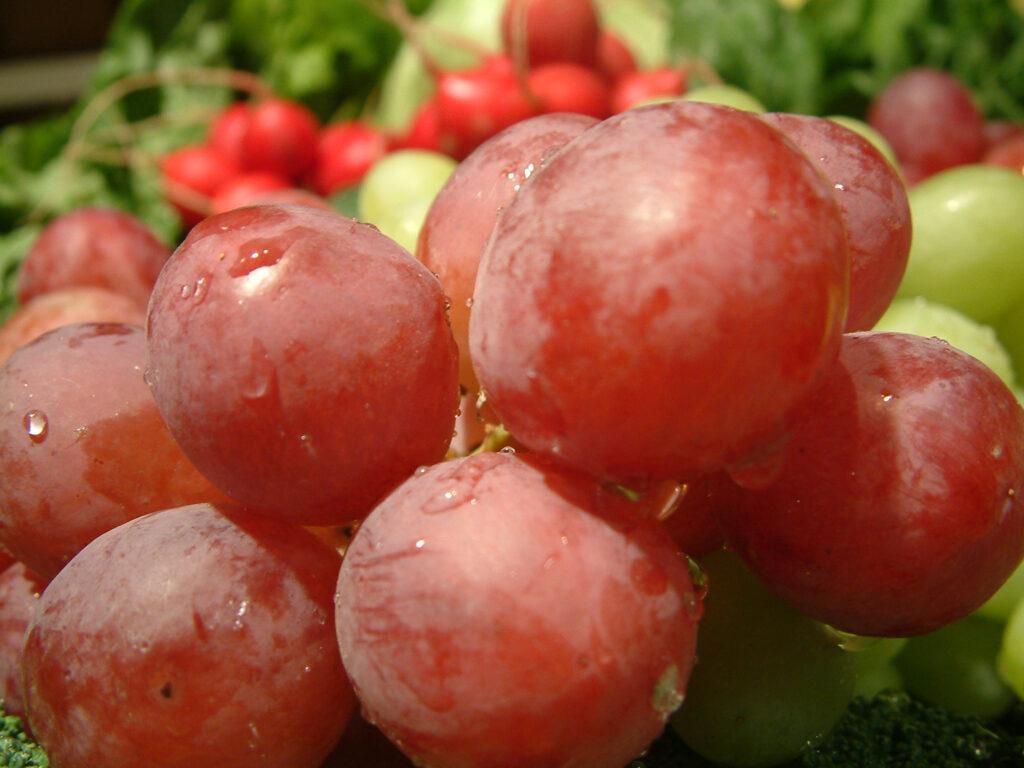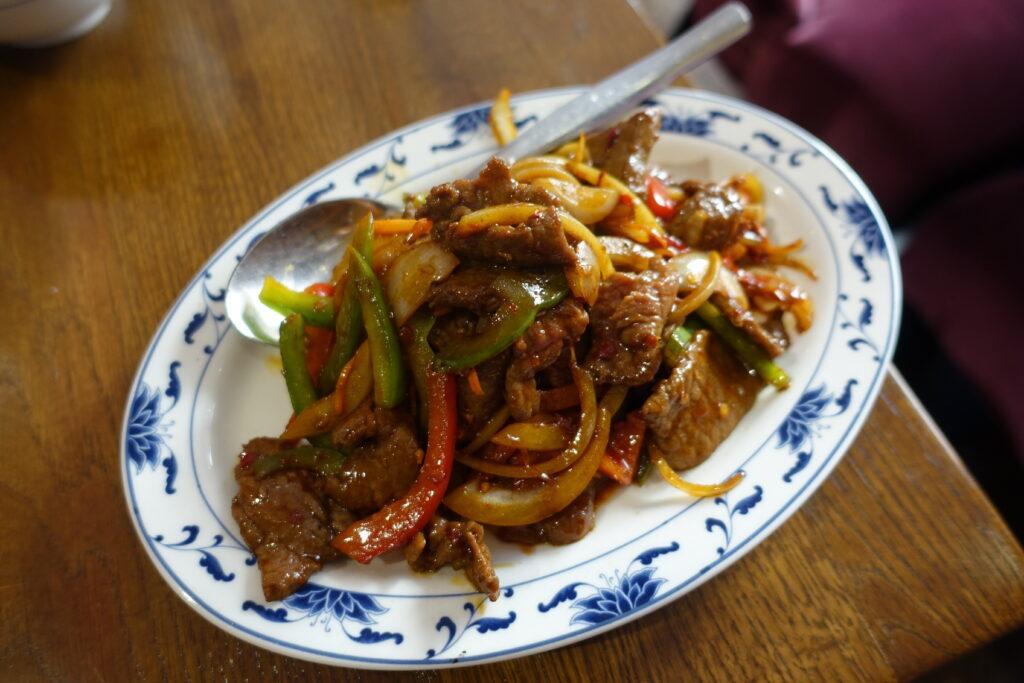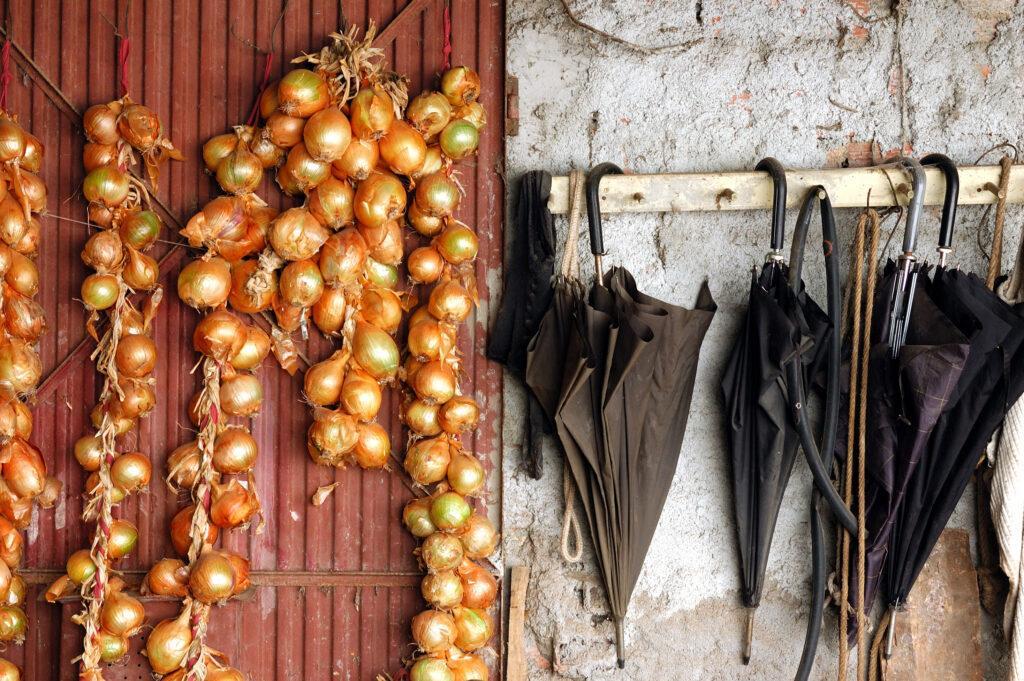By Alice Wang
In hot and humid weather, people naturally want to rely on cold food to cool down. Mung bean soup and cold watermelon are two of the top choices for many people.
The automatic tendency that we have in Western culture to cool down the body with cold foods will in fact do just the opposite; drawing coldness into the body, weakening the immune system and resulting in sickness. In fact, people need to eat some hot foods during the hottest days, to maintain a balance of coolness and heat in the body.

Practitioners of traditional Chinese medicine strongly advise that we try to only eat foods that are in season. Summer is the season of grapes, longan and lychee. Appropriate consumption of these warm fruits can improve gastrointestinal function and promote the basic metabolism of the body.
Among vegetables, pumpkin has a warm nature and is good for the spleen. It helps strengthen gastrointestinal motility. Leeks belong to the Yang nature. They supplement kidney function and helps increase appetite. People should pay attention to eat the right portions. Those who are weak in Yang and tend to feel cold and have a weak spleen and stomach can eat more. Those whose bodies are hot and humid, with Yang nature and suffer from acute conjunctivitis should be careful in eating these types of food.

People are likely to accumulate coldness in the body in the summer due to air conditioning and drinking cold liquids.
Eating warm foods such as mutton and beef can help heat the body and disperse coldness. They are especially good for those who have cold feet and cold hands in the summer and poor circulation.
An old saying goes: “A bowl of mutton soup in the summer saves you from a prescription.” But when eating hot meals you should pay attention to balance the intake of meat and vegetables and hot and cold foods.
When consuming mutton, you need to eat more cabbage, melon and green vegetables to balance the cold and the heat. If you have a toothache or fever, or if your body is hot in nature, you should not eat hot meat.

During the hottest days, many people lose their appetite and feel sluggish.
Ancient tradition suggested eating dumplings, followed by noodles, an egg and pancakes. This will energize the body. A bowl of hot, steaming food will help people sweat and release heat from the body, helping the body to cool down and improve appetite.
We can eat hot noodle soup or hot porridge as our main dish and thus ease the discomfort caused by cold food. Black tea as well has a warm nature. It is very good for people with a cold spleen and cold stomach.
Eating spicy food midsummer also helps release heat from the body. Sun Simiao, a well-known doctor during the Tang Dynasty, stated in his “Qianjin Prescription” that spicy foods dissipate heat from the body.
Modern scientific research also shows that spicy foods can cause blood vessels to expand, and cool down the body. In areas of heavy humidity, eating spicy foods in the summer can also “dehumidify” the body.
When cooking dishes, adding the right amount of onions, garlic, pepper and other hot spices not only enhances the flavor, but also kills germs and helps with detoxification and conditioning of the stomach and intestine.

Chili is rich in the bioactive substance capsaicin, which can improve appetite and promote digestion. It also helps to lower blood pressure, protect the heart and can accelerate the death of cancer cells, without harming healthy cells.
Frequent intake of fresh pepper in the summer is very beneficial. Pepper is rich in vitamin C and can strengthen the immune system. You should try not to fry pepper, or its health effects will be greatly reduced.
As the saying goes, “eat radish in the winter and eat ginger in the summer.” Ginger is spicy and has a warm nature. It is good for people with a cold body nature[J1] according to Chinese medicine theory. Adding ginger when stir frying vegetables helps to warm the stomach. It can also be mixed with jujube, brown sugar, etc.
One can also mix half ginger and half tea to warm-up the blood. Women who suffer from cramps during their periods, can drink this to help reduce menstrual pain. Adding ginger juice when eating sea foods helps kill the germs and and fends off the dampness.

Garlic can promote the body’s absorption of vitamin B1 and improve immune function. It also acts as an anti-bacterial and cancer agent and reduces triglycerides (fatty deposits in the blood)
Garlic’s potency is reduced with heat so it is more beneficial to eat it raw. The best way is to mash it into a garlic paste and eat it after 10 to 15 minutes. This is good for the formation of allicin, a compound with various antimicrobial features which is found in freshly crushed garlic.

Onion’s spicy ingredients are organic sulfides. Research has shown that organic sulfides have antibacterial, antioxidant, anti-cancer and anti-inflammatory effects.
After an onion has been cut open and exposed to oxygen for long periods, or after being cooked at a high temperature, the organic sulfide content will be reduced. Therefore, the best way to eat onion is raw or lightly cooked.

The colorless oil called allyl isothiocyanate is responsible for mustard’s intense, pungent taste. This active substance helps prevent cancer.
Mustard can irritate nasal passages so it is best not to eat it alone. It can be used on dumplings with vinegar or soy sauce.









Cancel anytime


Using our website
You may use the The Middle Land website subject to the Terms and Conditions set out on this page. Visit this page regularly to check the latest Terms and Conditions. Access and use of this site constitutes your acceptance of the Terms and Conditions in-force at the time of use.
Intellectual property
Names, images and logos displayed on this site that identify The Middle Land are the intellectual property of New San Cai Inc. Copying any of this material is not permitted without prior written approval from the owner of the relevant intellectual property rights.
Requests for such approval should be directed to the competition committee.
Please provide details of your intended use of the relevant material and include your contact details including name, address, telephone number, fax number and email.
Linking policy
You do not have to ask permission to link directly to pages hosted on this website. However, we do not permit our pages to be loaded directly into frames on your website. Our pages must load into the user’s entire window.
The Middle Land is not responsible for the contents or reliability of any site to which it is hyperlinked and does not necessarily endorse the views expressed within them. Linking to or from this site should not be taken as endorsement of any kind. We cannot guarantee that these links will work all the time and have no control over the availability of the linked pages.
Submissions
All information, data, text, graphics or any other materials whatsoever uploaded or transmitted by you is your sole responsibility. This means that you are entirely responsible for all content you upload, post, email or otherwise transmit to the The Middle Land website.
Virus protection
We make every effort to check and test material at all stages of production. It is always recommended to run an anti-virus program on all material downloaded from the Internet. We cannot accept any responsibility for any loss, disruption or damage to your data or computer system, which may occur while using material derived from this website.
Disclaimer
The website is provided ‘as is’, without any representation or endorsement made, and without warranty of any kind whether express or implied.
Your use of any information or materials on this website is entirely at your own risk, for which we shall not be liable. It is your responsibility to ensure any products, services or information available through this website meet your specific requirements.
We do not warrant the operation of this site will be uninterrupted or error free, that defects will be corrected, or that this site or the server that makes it available are free of viruses or represent the full functionality, accuracy and reliability of the materials. In no event will we be liable for any loss or damage including, without limitation, loss of profits, indirect or consequential loss or damage, or any loss or damages whatsoever arising from the use, or loss of data, arising out of – or in connection with – the use of this website.
Last Updated: September 11, 2024
New San Cai Inc. (hereinafter “The Middle Land,” “we,” “us,” or “our”) owns and operates www.themiddleland.com, its affiliated websites and applications (our “Sites”), and provides related products, services, newsletters, and other offerings (together with the Sites, our “Services”) to art lovers and visitors around the world.
This Privacy Policy (the “Policy”) is intended to provide you with information on how we collect, use, and share your personal data. We process personal data from visitors of our Sites, users of our Services, readers or bloggers (collectively, “you” or “your”). Personal data is any information about you. This Policy also describes your choices regarding use, access, and correction of your personal information.
If after reading this Policy you have additional questions or would like further information, please email at middleland@protonmail.com.
PERSONAL DATA WE COLLECT AND HOW WE USE IT
We collect and process personal data only for lawful reasons, such as our legitimate business interests, your consent, or to fulfill our legal or contractual obligations.
Information You Provide to Us
Most of the information Join Talents collects is provided by you voluntarily while using our Services. We do not request highly sensitive data, such as health or medical information, racial or ethnic origin, political opinions, religious or philosophical beliefs, trade union membership, etc. and we ask that you refrain from sending us any such information.
Here are the types of personal data that you voluntarily provide to us:
As a registered users or customers, you may ask us to review or retrieve emails sent to your business. We will access these emails to provide these services for you.
We use the personal data you provide to us for the following business purposes:
Information Obtained from Third-Party Sources
We collect and publish biographical and other information about users, which we use to promote the articles and our bloggers who use our sites. If you provide personal information about others, or if others give us your information, we will only use that information for the specific reason for which it was provided.
Information We Collect by Automated Means
Log Files
The site uses your IP address to help diagnose server problems, and to administer our website. We use your IP addresses to analyze trends and gather broad demographic information for aggregate use.
Every time you access our Site, some data is temporarily stored and processed in a log file, such as your IP addresses, the browser types, the operating systems, the recalled page, or the date and time of the recall. This data is only evaluated for statistical purposes, such as to help us diagnose problems with our servers, to administer our sites, or to improve our Services.
Do Not Track
Your browser or device may include “Do Not Track” functionality. Our information collection and disclosure practices, and the choices that we provide to customers, will continue to operate as described in this Privacy Policy, whether or not a “Do Not Track” signal is received.
HOW WE SHARE YOUR INFORMATION
We may share your personal data with third parties only in the ways that are described in this Privacy Policy. We do not sell, rent, or lease your personal data to third parties, and We does not transfer your personal data to third parties for their direct marketing purposes.
We may share your personal data with third parties as follows:
There may be other instances where we share your personal data with third parties based on your consent.
HOW WE STORE AND SECURE YOUR INFORMATION
We retain your information for as long as your account is active or as needed to provide you Services. If you wish to cancel your account, please contact us middleland@protonmail.com. We will retain and use your personal data as necessary to comply with legal obligations, resolve disputes, and enforce our agreements.
All you and our data are stored in the server in the United States, we do not sales or transfer your personal data to the third party. All information you provide is stored on a secure server, and we generally accepted industry standards to protect the personal data we process both during transmission and once received.
YOUR RIGHTS/OPT OUT
You may correct, update, amend, delete/remove, or deactivate your account and personal data by making the change on your Blog on www.themiddleland.com or by emailing middleland@protonmail.com. We will respond to your request within a reasonable timeframe.
You may choose to stop receiving Join Talents newsletters or marketing emails at any time by following the unsubscribe instructions included in those communications, or you can email us at middleland@protonmail.com
LINKS TO OTHER WEBSITES
The Middle Land include links to other websites whose privacy practices may differ from that of ours. If you submit personal data to any of those sites, your information is governed by their privacy statements. We encourage you to carefully read the Privacy Policy of any website you visit.
NOTE TO PARENTS OR GUARDIANS
Our Services are not intended for use by children, and we do not knowingly or intentionally solicit data from or market to children under the age of 18. We reserve the right to delete the child’s information and the child’s registration on the Sites.
PRIVACY POLICY CHANGES
We may update this Privacy Policy to reflect changes to our personal data processing practices. If any material changes are made, we will notify you on the Sites prior to the change becoming effective. You are encouraged to periodically review this Policy.
HOW TO CONTACT US
If you have any questions about our Privacy Policy, please email middleland@protonmail.com
The Michelin brothers created the guide, which included information like maps, car mechanics listings, hotels and petrol stations across France to spur demand.
The guide began to award stars to fine dining restaurants in 1926.
At first, they offered just one star, the concept was expanded in 1931 to include one, two and three stars. One star establishments represent a “very good restaurant in its category”. Two honour “excellent cooking, worth a detour” and three reward “exceptional cuisine, worth a
Thank you for your participation,
please Log in or Sign up to Vote

123Sign in to your account